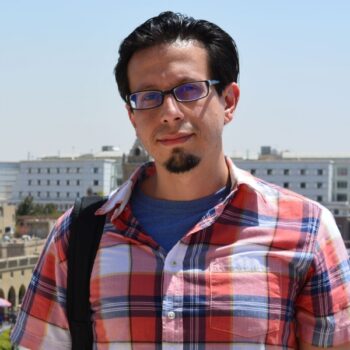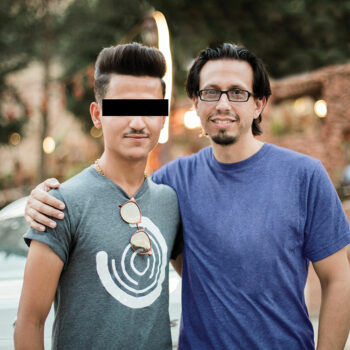 By Michael Ashcraft —
By Michael Ashcraft —
The reason why so many Saudis fill the ranks and leadership of terrorist organizations today is because teachers and preachers in Saudi Arabia praised the “holy war” of Muslims against non-Muslims in Afghanistan in the 1980s, says a convert to Christianity.
“A whole generation was brought up this way and taught to think this way,” says Nasser al’Qahtan. “Sadly the world is reaping the fruit for what we were taught when we were young.”
Nasser, who was born and raised on the eastern coast of Saudi Arabia, longed to die for Allah by waging jihad, and thus improving his chances of making it into Paradise. But along the way he converted to Christ and now exposes the diabolical beginnings of today’s world upheaval.
Nasser’s parents were opposed to the idea of their 12-year-old going to Pakistan for training and being smuggled into Afghanistan to fight the Russians, but many of his older friends did join jihad.
“God had other plans for me,” he says on a Your Living Manna video.
In the summer of 1990, Nasser plotted to run away and join jihad, but Iraq’s Saddam Hussein invaded Kuwait. At the time, he was actually in the United States with his mother visiting relatives and the ensuing world chaos prevented him from leaving “this evil nation” of America.
 Nasser hunkered down for the long haul, playing the role of the religious police with his younger siblings to make sure they still prayed and read the Koran. He didn’t want them to come under Satanic influences in America. Eventually, he worried about himself and eyed with suspicion the Americans around him.
Nasser hunkered down for the long haul, playing the role of the religious police with his younger siblings to make sure they still prayed and read the Koran. He didn’t want them to come under Satanic influences in America. Eventually, he worried about himself and eyed with suspicion the Americans around him.
“What was I going to do? I was surrounded by infidels. You either make a war against them or you try to bring them into Islam another way,” he says. “I thought Allah brought me here to evangelize them.”
Nasser’s English was very good and he thought his Islamic apologetics weren’t bad either.
“I began to tell everybody about Islam, my fellow students, my teachers, my neighbors, everybody I came into contact with,” he says. “I started to see some fruit. I started to see regular American people abandoning their prior beliefs and becoming Muslims. Some of them grew up in the church and they renounced Jesus. I thought I was fantastic.”
As he learned about American culture, he eventually perceived that born-again Christians were different than the rest of Americans (who he wrongly assumed to all be Christians), and he began to target them because he figured it would be easy for them to switch since they already lived clean lives.
One of those loving and clean-living Christians was a woman with whom Nasser fell in love.
“That was my undoing,” he admits.
 Only after marrying Daisy did he begin to correct her beliefs about Jesus. She should no longer idolize Jesus, who was nothing more than just another of Allah’s prophets, he said. Mohammad was the main guy.
Only after marrying Daisy did he begin to correct her beliefs about Jesus. She should no longer idolize Jesus, who was nothing more than just another of Allah’s prophets, he said. Mohammad was the main guy.
The pressure he put on her grew in time and caused great strain on their marriage, and even some Christian friends counseled her to divorce for being “unequally yoked,” a mistake she had made while being a nominal Christian.
But Daisy, pressured to evaluate her childhood faith, wound up affirming her relationship with Christ. Encouraged by an aunt who had been a missionary for decades in Brazil, she not only prayed for her husband but mobilized thousands of Christians in mega churches in North Texas to pray.
Those prayers began to take effect. Outwardly, her husband appeared secure in his beliefs, but inwardly he was struggling. He knew his sins were too great and the mountain of good works and prayers needed to offset them too much. He began to ponder again the easiest and most and most assured path to Paradise — jihad.
Finally, his wife ventured to invite him to church, which, out of curiosity, he accepted. His consciousness of his sin was so great that he concluded, “If I’m going to go to Hell, I might as well find out what they do in church.”
“I thought it was the most Satanic thing I had ever seen,” he says. “But I was so drawn to keep coming back by the love I felt there. Eventually he broke down and asked God for the truth.
“Immediately I had a vision. Everything before me was wiped away and I was transported to this rocky hill, looking down at this man who was so brutally beaten to the point of being unrecognizable,” he says. “He was being nailed to a cross. I knew this was Jesus.
“I watched as the cross was lifted up and He’s hanging there bleeding and struggling for breath. I’m looking Him in the eyes. He’s looking at me and through me. He sees all of my junk, the hidden things in my life. I feel this wave of shame.
“But he’s not looking at me with disgust, which is what I expected. He’s looking at me with this fierce love. As He’s fighting for every breath on the cross, He’s fighting with every breath for me.”
 The darkness from all humanity was put on Him on the cross.
The darkness from all humanity was put on Him on the cross.
“The darkness wasn’t overcoming Him. He was overcoming it.”
Then Jesus said, “It is finished.”
“The reason I did this is that you and all the people that were meant to be my children were snatched away from Me, and you sold yourselves to other powers. To buy you back, this was the cost. This was the price that I paid for you Nasser.”
The vision disappeared. Nasser hadn’t heard the sermon. But the pastor gave one more invitation to accept Jesus.
“I found myself confessing Jesus Christ as my Lord, as my God, as my Savior,” he says. “As soon as I said that prayer, I immediately felt a fire fall upon me. I felt wrapped up in this amazing presence that was pure peace and love and belonging. It was the most amazing thing that I had ever felt.
“That day, the man who walked out of that church was not the same man who walked into that church.”
At first he didn’t want to tell his family of his conversion because he knew it would cause great upheaval. It took him a week to even tell his wife.
She was excited. She told the whole church.
Nasser feared his family would hear of it, so he decided to get ahead of the rumors.
“It was a terrifying thing. I began with the person who I thought would be the easiest to tell, my younger sister,” he said.
He expected rejection from her. Instead, she accepted Jesus too.
Then a brother. His mother was open-minded but didn’t accept Jesus. His father was “so hurt, so upset, so angry.”
Nasser lost most of his relationships in Saudi Arabia.
Today Nasser’s heart weighs heavily under the pain of the souls he pulled into Islam before becoming Christian. “I carry a lot of pain with me today because they renounced Jesus,” he says.
If once Saudi Arabia manufactured terrorists and jihadists, slowly but surely many are now coming to Christ. “It’s happening,” Nasser says.
If you want to know more about a personal relationship with God, go here
Michael Ashcraft sells bamboo steamer baskets online to supplement his income as he writes Christian journalism for free.



